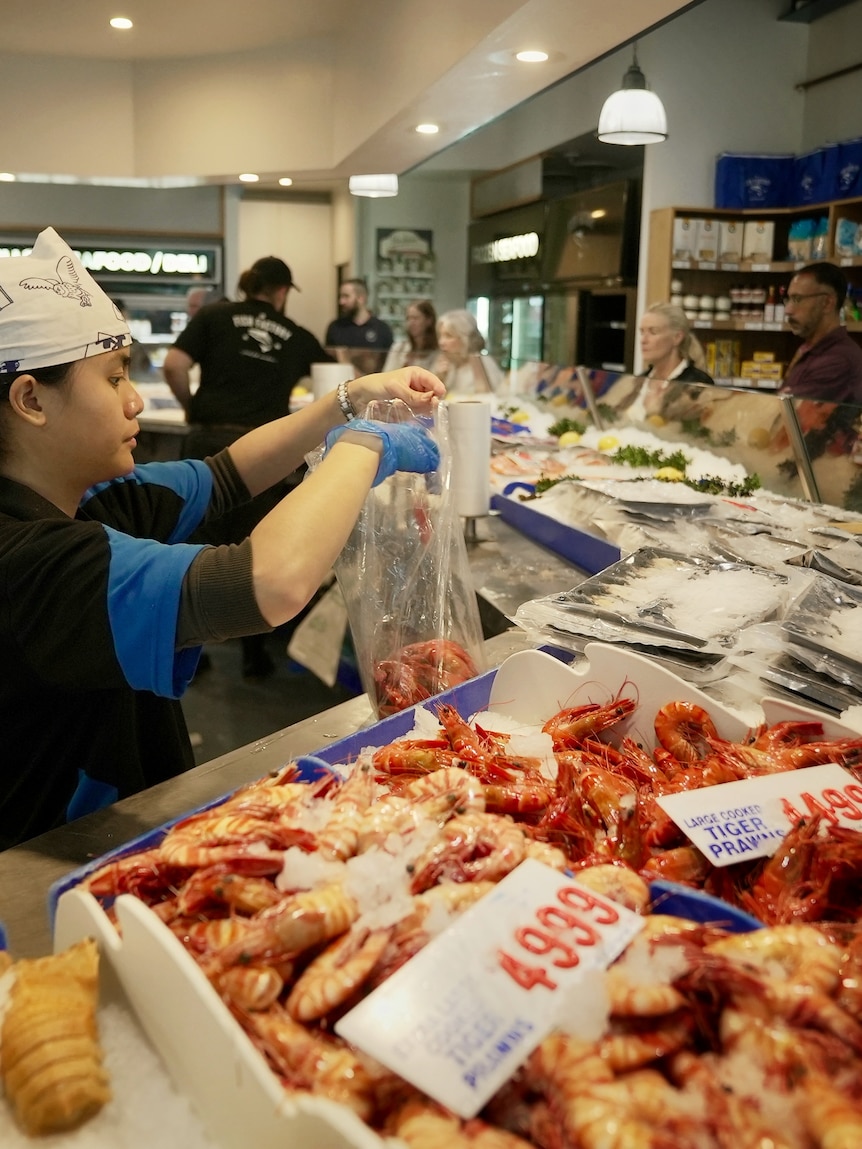If the iconic wild barramundi is on your menu for a traditional Easter seafood feast this weekend, you’d better get in quick as supplies are tight.
The seafood shortage is due to a crackdown on net fishing on the reef and months of bad weather, including cyclones in the Gulf of Carpentaria, according to the Queensland Seafood Industry Association.
Chief executive David Bobbermen said popular king threadfin (king salmon) and Spanish mackerel were also in low supply due to restrictions around gillnet fishing licences, which were reduced from 100 down to just 23 in the last year.
“Bit of a mixed season coming up [as] prawns, crabs and bugs are in plentiful supply but the cyclones and floods — in the Gulf and along the east coast — have left us with a smaller catch,” he said.
“The bad weather also restricted logistical access to key ports like Karumba [and] prevented artisan fishers going to open waters to handline catch species like red emperor and coral trout as well.”
Mr Bobbermen blamed tough netting management reforms, which he said were put in place by federal and state governments last year to “appease” UNESCO.
“It significantly reduced the amount of area able to be fished — it’s a huge reduction — and while we eagerly await a few more licences … they have not been issued in time,” he said.
“So, supply of sustainably caught wild fin fish is challenging now and will be even more so by Christmas.”
The gillnet ban aims to better protect marine life in the Great Barrier Reef — including dolphins, turtles and dugongs — and to boost local fish populations.
However, the industry maintains the nets were not used on the Great Barrier Reef; only in rivers, creeks and foreshores.
“They have been used successfully for over 100 years, have a low carbon footprint, and we do not believe they needed to be reduced,” Mr Bobbermen said.
He referred to data from Fisheries Queensland, which showed the catch rates of three popular species were down by almost 130,000kg for the current reporting period.
Species | Caught before Easter 2023 | Caught before Easter 2024 |
|---|---|---|
Barramundi | 51,457kg | 32,313kg |
King threadfin | 12,848kg | 7,119kg |
Spanish mackerel | 182,454kg | 77,928kg |
“This ignores any impacts yet to be felt by the proposed net-free zones in the Gulf of Carpentaria, to come into effect from 15 May this year,” Mr Bobbermen noted.
He said prices, however, are expected to be reasonably consistent with last year.
Big wet also impacts farmed barramundi industry
While the fast-growing farmed barramundi sector is worth $126 million, it was also impacted by bad weather ahead of the Easter rush.
Australian Barramundi Farmers Association chief executive Jo-Anne Ruscoe said four of their farms in the Cairns region were damaged in the January floods, but suppliers in other states have picked up the slack.
“We have a lot of empathy for what the wild catch sector has been going through, it has been a tough time for everyone,” she said.
“But the message for consumers is: supply is now good, and quality [is] exceptional.”
Ms Ruscoe stressed 60 per cent of barramundi eaten in Australia was imported from Asia, wholesaling for around half the cost of the local product.
Her key message was to “ask for Aussie barra first”, as it would have been sustainably farmed with environmental protections.
Rain has been ‘good’ for tiger prawns
While the bad weather wreaked havoc on the seafood industry up north, Moreton Bay fishers have been celebrating a great catch this season.
Industry spokesman Greg Savige said with the rain, nutrients and feed had come downstream, helping prawns grow quicker and breed faster.
Australian Prawn Farmers Association executive officer Kim Hooper said farmed tiger prawns were also in plentiful supply.
The industry now produces up to 10,000 tonnes of prawns a year, up from just 3,900 tonnes six years ago.
“We are mindful the cost of living is hurting everyone and our producers have not increased prices at the farmgate this year,” she said.
“Prices however are determined by the retailers — but with another bumper Easter season this year, I am hearing that prices will be very attractive to consumers.”
According to Fisheries Research and Development Corporation data, seafood lovers eat over 33,000 tonnes of crustaceans each year.
‘Crazy time’ of year sees sourcing from outside Queensland
A Morningside fish market gets thousands of customers filing through its doors over Easter.
Co-owner Chris Savva said “it is a crazy time” and, because the “wild” varieties in Queensland have dwindled, he has had to reach out to interstate suppliers, as well as from New Zealand.
“So we are lucky from a wild perspective we have got the kilos back up. New Zealand are our only fresh co-partner,” he said.
“We missed a couple of loads from the Northern Territory but the locals guys, [those] who can, are still fishing and they will also be air-freighting a lot of the exotic fish to us.
“The shortage is spread across the country so we make it up with a bit of aquaculture as well.”
Meanwhile China’s trade ban on Australian lobsters means the delicacy is cheap here — they are selling for $65 rather than more than $100.
Source : ABC News (AU)


